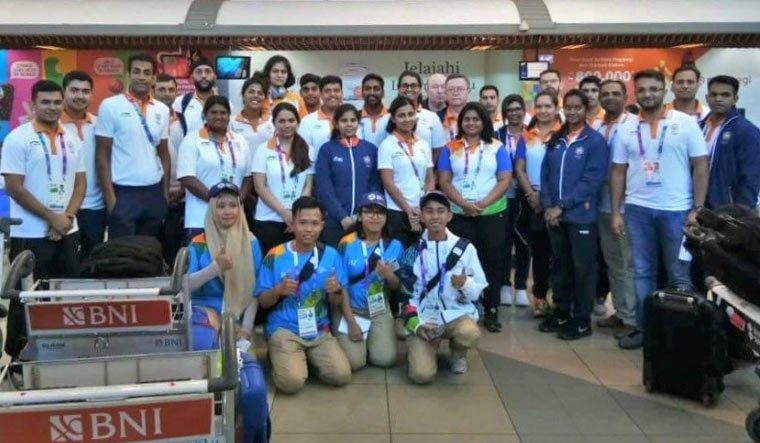As I stood in queue at the Singapore airport, groggy after a long flight and pep-talking myself into boarding the next one to Jakarta, there sat, a few yards away, an elderly man in an India tracksuit. Near him were two young men, again in India uniform. The Asian Games were to begin in a few days. I turned around to ask my colleague about them when, happy happenstance, the shooting coach I had spoken to two days ago stood behind me. I introduced myself, shook his hand and wished him well. We both went ahead and boarded. And that was that, I thought.
But, after having found my seat, I saw a parade of India shirts walking down the aisle. The coach’s wife, one of India’s star shooters, sat down a seat away from me. She looked tired, and rightly so. It was early morning, after a long flight.
also read
- Asian Para Games: Sumit Antil wins javelin gold, breaks own world record
- Indians sweep all medals in two events to begin Para Asian Games campaign in style
- 'Bridge is antithesis of gambling': Asian Games silver medallist Jaggy Shivdasani
- Asian Games hockey: Indian women beat defending champions Japan to win bronze
- Asian Games chess: India men and women settle for silver
To her right, a row ahead, the two teen sensations in the team, both recent international medal winners, and both fancied to win again, sat down next to each other. Their coach, a disciplinarian and a former Asian Games medallist himself, had recently asked people to stop hounding the two. A request I had in mind while surveying the shooters.
The squad, apart from the skeet team, was on its way to Palembang, where the shooting events begin August 19. As always, India expects a lot from the sport, with good reason. Several of the youngsters have had stellar records and the seniors, too, have hit the mark. A huge blow, however, was the dropping of team events, which had been a safe bet for India in terms of medals.
Regardless, the shooters seemed ready. There was a sense of calm, but also fatigue. “Mujhe phir se beech me bitha diya (they’ve once again given me the middle seat),” said one of the young south Indian shooters, addressing one of her teammates. The young man offered to switch seats, and they did. Chivalry lives, I thought.
Just as there was more talk among the marksmen, a suited businessman in the seat behind drowned the conversation with jargon. Something about “command structure repositioning”.
I drowned him out with my headphones, watching reruns of a sitcom that had gone downhill since season six. As the laughter track made me cringe, two strapping men, again in India shirts, asked me to let them have their seats. One an Asian Games bronze medallist in an air rifle event, and the other an ISSF bronze medallist in another air rifle event. I immediately gave way and, becoming extremely aware of my physique, sunk into my seat.
I tugged on the TV remote, which was badly stuck, and my neighbour, after observing me for a few seconds, unstuck it for me. Yes, it was an embarrassing moment, but I had earned myself an anecdote.
The rest of the flight went smoothly. And, upon landing, I wished my row mates all the best. They smiled and thanked me. And that was that.
It was strange to see the stars you watch on television doing mundane things in a mundane setting. Eating, watching TV and sleeping instead of pointing a gun at a target and pulling the trigger. Somehow, in my mind, the plane ride humanised them. They, too, were regular people, as exhausted as anyone would be by the length of the flight and the weight of expectations. “They are not machines,” the aforementioned coach had once told me. I found myself nodding in agreement.


